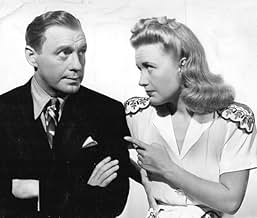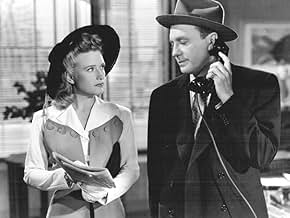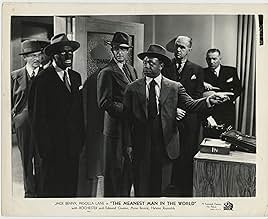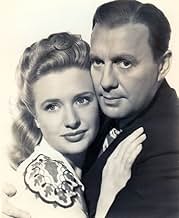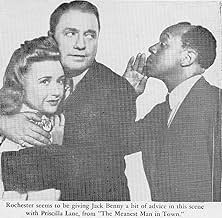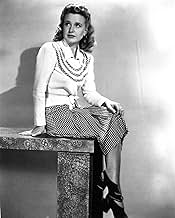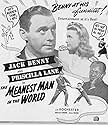Añade un argumento en tu idiomaA compassionate lawyer pretends to be heartless in order to boost his clientele, but it jeopardizes his romantic life.A compassionate lawyer pretends to be heartless in order to boost his clientele, but it jeopardizes his romantic life.A compassionate lawyer pretends to be heartless in order to boost his clientele, but it jeopardizes his romantic life.
Jackie Averill
- Boy with Lollipop
- (sin acreditar)
Conrad Binyon
- Boy
- (sin acreditar)
Morgan Brown
- Pedestrian
- (sin acreditar)
Paul E. Burns
- Farmer
- (sin acreditar)
Ralph Byrd
- Reporter
- (sin acreditar)
James Carlisle
- Client
- (sin acreditar)
Hobart Cavanaugh
- Mr. Throckmorton
- (sin acreditar)
Edward Clark
- Jury Member
- (sin acreditar)
Chester Clute
- Lawyer
- (sin acreditar)
Argumento
¿Sabías que...?
- CuriosidadesIn March 1943, when the film was in wide release, a lawsuit brought by a group of lawyers from New Haven, Connecticut charged that this comedy "showed the legal profession in a disreputable light." The complainants asked for the movie to be withdrawn, but their plea was thrown out by Connecticut Superior Court Judge Patrick O'Sullivan.
- Créditos adicionalesEddie Anderson is credited as only "Rochester."
- ConexionesVersion of The Meanest Man in the World (1923)
- Banda sonoraI Wonder Who's Kissing Her Now?
(uncredited)
Music by Joseph E. Howard and Harold Orlob and lyrics by William M. Hough and Frank R. Adams
Reseña destacada
Jack Banney and Rochester (Eddie Anderson) really go to it in this comedy romance. The two toss barbs back and forth with ease that even outdid their frequent banter on Benny's radio show at the time. "The Meanest Man in Town" is a light comedy with a simple plot and not much of one. Benny's small-town lawyer can't make it as a lawyer at home, nor as an ambulance chaser in the Big Apple. The reason is because of his big heart. But, when circumstances happen that make him appear mean in the press, much changes.
And, from that point on, the film turns into screwball comedy. The ending is a real hoot. Edmund Gwenn has a small role, but it's one of the few in which he played the meany, or a villain or bad guy. But, because of the nature of this film, even Gwenn's nasty appearance is occasion for a chuckle.
Jack Benny was highly popular with his unique laid back humor, using long pauses with a sometimes dour and sometimes cynical persona. A Jack Benny program ran weekly on the radio from 1932 through 1948. Then he had a long-running TV series, "The Jack Benny Show," that ran from 1950 thru 1965. His movie making was sparse during the latter, but he had many appearances on other TV series and shows. Most of his two dozen films before that were box office hits.
And, from his first appearance in 1937, Eddie Anderson became a major part of Jack Benny's radio and then television shows. In the 1950s, Eddie was the highest paid African-American in radio and television. The two men were great entertainers, loved by audiences in the mid-20th century. They remained close friends until Benny's death in 1974.
The film may be far too slow for modern audiences, but those who like good old fun and comedy in films, should get a kick out of this movie.
And, from that point on, the film turns into screwball comedy. The ending is a real hoot. Edmund Gwenn has a small role, but it's one of the few in which he played the meany, or a villain or bad guy. But, because of the nature of this film, even Gwenn's nasty appearance is occasion for a chuckle.
Jack Benny was highly popular with his unique laid back humor, using long pauses with a sometimes dour and sometimes cynical persona. A Jack Benny program ran weekly on the radio from 1932 through 1948. Then he had a long-running TV series, "The Jack Benny Show," that ran from 1950 thru 1965. His movie making was sparse during the latter, but he had many appearances on other TV series and shows. Most of his two dozen films before that were box office hits.
And, from his first appearance in 1937, Eddie Anderson became a major part of Jack Benny's radio and then television shows. In the 1950s, Eddie was the highest paid African-American in radio and television. The two men were great entertainers, loved by audiences in the mid-20th century. They remained close friends until Benny's death in 1974.
The film may be far too slow for modern audiences, but those who like good old fun and comedy in films, should get a kick out of this movie.
- SimonJack
- 31 ago 2024
- Enlace permanente
Selecciones populares
Inicia sesión para calificar y añadir a tu lista para recibir recomendaciones personalizadas
Detalles
- Duración57 minutos
- Color
- Relación de aspecto
- 1.37 : 1
Contribuir a esta página
Sugerir un cambio o añadir el contenido que falta

Principal laguna de datos
By what name was The Meanest Man in the World (1943) officially released in Canada in English?
Responde
